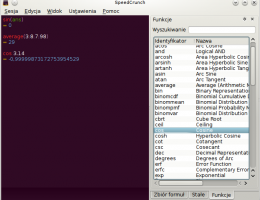
- #Speedcrunch vs qalculate windows 10
- #Speedcrunch vs qalculate Pc
- #Speedcrunch vs qalculate windows 7
- #Speedcrunch vs qalculate windows
When Qalculate is using up 75MB, it's just another straw on the camel's back. I do a lot of image and video processing, as well as neural-networks, so RAM is almost always used at capacity. But honestly it's nothing more than a bad feeling except if you have to use low end hardware. I also don't like it when applications use more memory than they should. At the same time, I understand why load times are slow and the application takes up a lot of wrote: Overall, I would like to encourage improving load speed and reducing memory overhead. Getting rid of D-Bus might help, and perhaps that can be investigated. Of course, getting rid of GTK would help tremendously, but I somehow doubt Hanna is interested in embarking on that project! :) As she mentioned, many of the libraries that Qalculate uses are present on Linux systems but not on Windows. I understand, completely, that Hanna may not be able to do much to rectify these issues.
#Speedcrunch vs qalculate windows
(My favorite full-featured Windows text editor takes up <5MB RAM and opens instantaneously. Although quite large for a calculator, I might be able to dedicate 65-75MB (55-65MB for Qalculate + 10MB for the required gbbus.exe) for it. I typically close applications when I am done with them, but perhaps I'll make a rare exception for Qalculate. It sounds like it may be a little faster than Windows 10, but not by leaps and bounds.
#Speedcrunch vs qalculate windows 7
I thought it was the old rust platters I often use.įWIW, I tested on Windows 7 64-bit. It's interesting to hear that even people using SSDs are experiencing the delay. Waiting 2-5 seconds for a calculator to appear isn't the end of the world, but does make me want to click the "Calc" button instead of the "Qalculate" button. On Windows, I was using Microsoft's Calc, which loads almost instantly. The only things possibly holding me back are the long load time and memory use. I just found Qalculate the other day, and I'm so impressed with it that I would like to make it my "everyday" calculator. Perhaps D-Bus might be part of the problem?.This issue does not, in my experience, exist at all on GNU/Linux.The main delay occurs before the creation/loading of any GUI elements and any calculator specific processes (after g_application_run, between the signal handlers for "handle_local_options" and "activate").The GUI-less qalc, which performs many of the same preparations as qalculate-gtk, appears to open instantaneously.The GUI for windows other than the main window are loaded from XML files when needed. Most of the qalculate-gtk GUI is loaded from XML files (these are however part of the binary).As I wrote earlier, the GTK demo application is almost as slow.What's GTK making it do? Does the UI have to be parsed from XML or something every time and then rasterized? It seems like the UI data or graphics should be in a ready-to-load efficient binary format, and it should just load the UI instantly while also launching any necessary processes in parallel. Yet lots of apps take several seconds to load, and I'm not sure why.
#Speedcrunch vs qalculate Pc
it seems like 200 ms would be far more time than a PC and OS should need to load an app. Given the reported latency figures for things like an SSD call, random I/O reads, CPU cycles, memory access latencies, etc. This is a broader issue/mystery to me than just Qalculate. It's a mystery to me why any application takes more than say 200 ms to fully open and be ready for user input and interaction. do you think it's GTK overhead? Is this a typical issue with GTK apps on Windows? I don't know much about it – does using GTK mean that it's not using native Windows APIs? Would native Windows APIs be faster? What it's doing when it opens is unclear. In both cases we're talking SSDs or Optane, and RAM shouldn't be a bottleneck for either system.Īt idle, Qalculate is using 0% CPU and about 31 MiB of RAM, so pretty lean. So the hardware is decent not the fastest, not the slowest. It takes about the same time on my laptop, which has a Whiskey Lake CPU, using an Optane cache SSD accelerator paired with a PCIe SSD, also 16 GiB of RAM. I'm using a SATA SSD, Skylake CPU, 16 GiB of RAM. Microsoft Word 64-bit takes about two seconds cold (the version is "365", which is confusing – I think it's also known as Office 16.xx). Speedcrunch takes about one second cold start.

Reopening after closing takes three seconds. Cold start can take five seconds, maybe more.
#Speedcrunch vs qalculate windows 10
I've noticed the slow loading as well on Windows 10 Pro, 64-bit, Qalculate 3.17.


 0 kommentar(er)
0 kommentar(er)
